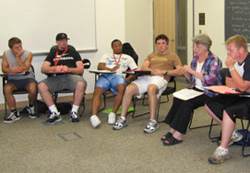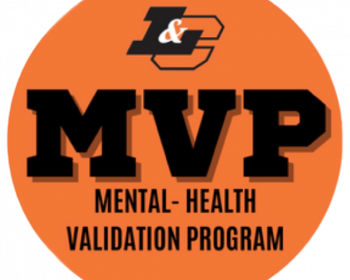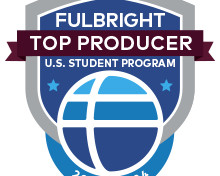Director of Physical Education & Athletics, Clark Yeager explains, “the purpose of a program such as this is to make it clear to our new student-athletes, particularly those who have their first competition early in the fall, that they must begin early to divide their time appropriately between their academic and athletic pursuits. Just because school hasn’t started, and they are working all day on their sport during pre-season training, the reality of school demands will soon be upon them and they must make the adjustment quickly. Infusing some academic focus into the pre-season when normally it would be all football, is an attempt to guide these very bright kids.”
This program was piloted this fall with the Pioneer football team, with the strong support of Head Football Coach Chris Sulages. Sulages comments, “it is essential for freshman to understand that we are serious about academics, most coaches just talk about it, we wanted to make sure our emphasis came across as early as possible.” Sulages also explains that he and his staff believe that all incoming players will benefit significantly from additional preparation in the transition from high school to college.
The department teamed up with Director of the Writing Center, Dr. Susan Hubbuch, Coordinator of Academic Advising and Exploration & Discovery professor, Dr. Kristi Williams, and Director of Health Promotion and Wellness, Melissa Osmond to offer a series of workshops for members of the first-year class that would enable them to take leadership roles in their classes. The first workshop focused on the student-athletes‘ transition from the high school classroom to the Lewis & Clark classroom, emphasizing key study strategies and classroom skills. The second session was devoted to the core class that all first-year students take, Exploration & Discovery. The third workshop was dedicated to teaching the team time management skills.
Over the summer, students enrolled in Exploration & Discovery were asked to read excerpts from an essay by the great American poet T. S. Eliot called “What is a Classic?” “Since most of the course’s common works…have at one time or another been hailed as classics,” as Kurt Fosso, Director of Exploration & Discovery, explained in his letter to first-year students this summer, the Eliot essay was assigned to open a “serious conversation about the nature or character of a classic work.” In the second of the two sessions for the football players, the students were encouraged to brainstorm about their understanding of the essay with the help of Dr. Kristi Williams and Dr. Hubbuch.
According to Dr. Hubbuch, the session was wonderfully successful. Even though many in the group ranked the essay difficult to read, the conversation was lively, students were engaged, and almost everyone had something to contribute. The conversation mimicked in many ways an actual class session –or perhaps the kind of class session most instructors dream of having.
According to Dr. Hubbuch, there were two factors that contributed to its success. First, this group of individuals walked into this classroom not only already knowing one another, but, even more importantly, already used to working together as a team. Second, even though there were three “authority figures” present in the room, two of whom were facilitating the conversation, there was no “teacher” present. The result was that these entering students got a very good sense of what a college class discussion would be like, without those factors that tend to intimidate students into silence.
“It was impressive,” Dr. Hubbuch commented, “that students felt comfortable admitting their ignorances and/or their uncertainties.” “One trick to working with a group of students,” Dr. Hubbuch went on to say, “is to let them see how much they actually ‘got’ from their reading, even though they may feel they have understood very little.” “I have no doubt,” she continued, “that when this group has their first class session in E&D, they are going to feel that they have a good basic understanding of the text and they are going to feel comfortable speaking up in class.”
“When I ran into problems with my T.S. Eliot paper, I remembered our team discussion in the writing workshop and all the problems disappeared,” explains Joe Morris, first-year defensive back from Mission Viejo, California. This sentiment was shared by many first-year football players in attendance. Many noted that after these workshops, they knew exactly where to go when they were having problems with writing, time management and other transition issues.In retrospect, Yeager comments, “based upon the initial feedback and reactions, it would seem that our goals have been largely met.” With the excitement both from the students and the staff members involved, the Athletics department looks forward to integrating this program into all future pre-seasons for football and hopes to expand the program to other sports as well.


